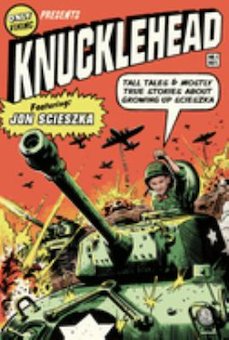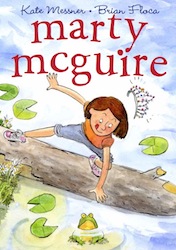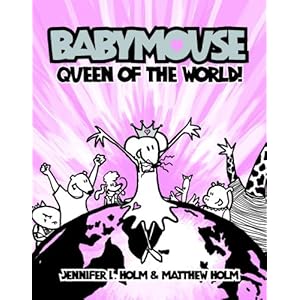
These questions are taken from p. 57 of
Reading Matters: What the Research Reveals about Reading, Libraries, and Community.
1. What is the first book that you can remember either having read to you as a child or reading yourself? What can you remember about it?
We didn't have story time in my family. Reading happened, but it wasn't a shared activity. The first book that I
remember reading all by myself was
The Golden Children's Bible. I know that I had read many picture books before that, because my mom had signed my brother and me up for a program that delivered us a stack of shiny new books each month. It was probably a Scholastic program. But I distinctly remember sitting on my bed, deciding to take on the
Children's Bible, and I remember that when I finished I was so proud of myself that I ran to my mom to tell her what I had done. The images are probably what stuck with me the most, and that's why I was able to figure out which exact children's Bible it was that I read.
2. Can you think of a book/story that really stands out in your memory? What was special about it?
There are so many books that stand out that I don't know how I can narrow them down, so I guess I'll start from the beginning. There is one paperback picture book I received through the Scholastic reading program that has always stuck with me, but annoyingly I can't recall the title nor can I find it anywhere. It's about a little girl who is afraid of EVERYTHING. She doesn't like taking baths because she's afraid she'll get sucked down the drain. She doesn't like escalators because she's afraid she's going to get pulled into the belt, etc. I loved that book. It's obviously not a popular or well-known story, or I might have found it by now. Sad face. Most of my reading in childhood was serendipitous. The books that I enjoyed the most, or have a lasting impression of, were books that fell into my lap one way or the other, not the books that I picked for myself from the library.
3. What do you remember reading next? Next? After that?
I can't pull out a timeline from my memory of childhood reading. I'm sure there were a ton of books I read that didn't stick with me. Perhaps the books that I owned stay with me the most, because as they were easy to access, I read them the most. I remember around second grade my grandpa gave me a picture book that I found "boring," but read again and again, about a girl on a farm in the country during the winter not doing a whole lot. I think she went to church on Sunday, but I can't recall. I think I remember a black horse(s?) pulling a sleigh. I remember the book seemed "elegant" to me - it was hardback with a shiny jacket cover, glossy pages of white with embedded pictures and text underneath. And the cover was forest green with a snowy picture in the center.
4. Was there anything in your childhood experience that you would say fostered reading? Discouraged reading?

I think the adults in my life fostered reading for me - teachers, parents, grandparents. The simple act of giving me books - whether as gifts, garage sale finds, pillaged from the lost and found, or a monthly book delivery program, and visits to the public library - all were signs that reading is an act of enjoyment. As I got into my preteen years and started to enjoy books like Goosebumps, Christopher Pike, and (shamefully - but not really) V. C. Andrews, I did have a couple of (boy) family members who told me that my reading choices were not REAL reading, not REAL books. That's when I started to develop guilt for certain reading choices and the idea that all reading wasn't created equal. Meanwhile, they were reading Stephen King, and if I had the wisdom I have now I could have argued the same about their reading choices, but alas, I was only twelve.
5. When you were a child, did you think of yourself as a reader?
Quite simply, yes. What kind of reader? Good? Poor? Well, that's another story. I probably didn't think too highly of my reading abilities. I was never the smart kid in class until I went to an inner-city school; then somehow I was seen as the smartest kid in class. If it hadn't been for that boost of self-confidence, I probably would have always been an average, or under-accomplishing, student, because no teacher ever thought much of me before then.
6. How, if at all, did your reading interests change as you reached adolescence?
I think the Goosebumps series was the gateway to less savory reading choices. Again, I became obsessed with Christopher Pike books in middle school, and most of the teacher-recommended reading I hated. I remember having to read Cynthia Voigt's
Homecoming and
Dicey's Song in seventh grade, and I just really didn't care for them. My sophomore year of high school, our English teacher had a whole unit on YA novels. She had class copies of ten or twenty different titles featuring authors like Chris Crutcher, Robert Cormier, and Lois Duncan. She book talked each one, and they were pretty scandalous. I learned about the guy who pokes his unit through the bottom of a popcorn bucket in the movie theater so that when his date reached down she got a handful of something else. We were shocked what our teacher was telling us, but she was 70 and crazy and would spend almost an entire class period telling us about Woodstock. In high school, most of my book choices came from friends' recommendations.
7. How do you choose a book to read?
Again, recommendations are an important factor in my book selections. Currently, most of my reading is for my grad classes and keeping up with the latest in children's literature. The library plays a role in what I read when, too. I'll put a ton of books on hold, and so I usually read whatever it is that has become available before I read something that's sitting on my bookshelf, because I know I only have so much time to read the library book before it's not available anymore.
8. Where do you get the books you read?
I'd say about 80% of the books I read are from the library. The remaining 20% are books that I've either purchased or have had given to me. I have a Nook, so it is quick and easy to purchase e-books instantaneously, but I still like physical books as well.
 |
| Really, Oprah? |
9. Are there types of books that you do not enjoy and would not choose?
Harlequin romance novels, books from Oprah's book list (I've never enjoyed any of her recommendations that I've tried), dry, self-indulgent literature wherein the author is just showing off his craft but not actually saying anything important, books written and advertised for the common "housewife" usually about a middle-aged woman in a boring marriage with 2.5 children who does something radical like joins a quilting club or has an affair - basically that whole shelf in Target labeled Fiction.
10. Has there ever been a book that made a big difference to your life in one way or another? (probe: What kind of difference? How did it help you?)

Ray Bradbury.
The Martian Chronicles.
Fahrenheit 451.
Dark They Were, and Golden-Eyed. I don't know that these books made a difference in my life except that they made me love reading even more. I just love his books.
Fahrenheit 451 became my platform for the importance of reading, and perhaps my decision to become a reading teacher and now a library student.
11. What would it be like for you if for one reason or other you couldn't read?
This question is ambiguous. I'm not sure if the author means "can't read" as in illiterate, or "can't read" as in I'm prohibited from doing so, or "can't read" as in there is absolutely no time for it. If I'm illiterate, then my world would be very limited on what I could do. I couldn't write a blog, couldn't check up on friends on Facebook, wouldn't be a grad student, wouldn't have a great job, etc. If I was prohibited from reading, I'd probably watch more television. If I didn't have time, then I'd be sad and stressed out because reading is calming and therapeutic for me, as well as it helps me make sense of my world.
12. If you could get an author to write for the "Perfect Book" what would it be like? What elements would it include?

That's a hard question. I guess it would have the romance and dark turmoil of
Rebecca, the author's views within
Things Fall Apart, and the sci-fi world of either a Ray Bradbury or Kurt Vonnegut. Although, I think all of those elements mixed together would probably make a terrible book. I think each of those on their own are perfect books, so why can there be only one?
13. What would you say is the role of reading in your life?
I would say it's my livelihood. It provides me a community to which I belong. It gives me a larger view of the world I live in. It lets me live 10,000 lives. It teaches me lessons. It educates me. It entertains me. It's solid good fun!

























